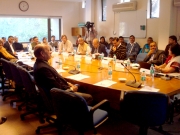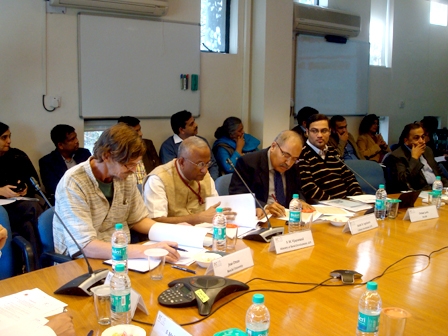Roundtable discussion on Mahatma Gandhi National Rural Employment Guarantee Act
08 Dec 2014
Past Event

This roundtable organised by NCAER presented some of the results from India Human Development Survey (IHDS), a unique panel survey carried out by NCAER in collaboration with University of Maryland. First round of this survey of over 41,000 households was conducted in 2004-5, just before NREGA was implemented. The second round conducted in 2011-12 resurveyed the same households, allowing us to explore household participation in MGNREGA as well as changes in household conditions following implementation of the act. Some of early results were discussed at this roundtable along with the strategies for future research to ensure that the research is responsive to current policy needs.
Dr Sonal Desai, Senior Fellow at NCAER and Professor of Sociology at the University of Maryland while presenting some of their initial findings from the research explained that the results from the India Human Development Surveys suggest that restricting MGNREGA to only the 200 poorest districts is likely to be ineffective—and that it may be better to target households, the reasons being :
A greater proportion 69% of India’s poor live outside the 200 poorest districts.
While 28.4% of households in the poorest districts participate in MGNREGA, 22.8% of households in other districts also benefit from MGNREGA.
The 22.8% of households from other districts are actually more reliant on MGNREGA income than households in the 200 poorest districts.
The presentation of some of the early results on MGNREGA participation was chaired by Dr Pronab Sen, Chairman, National Statistical Commission while the Panel Discussion on Research Needs for Effective Policy Design was chaired by Dr Satish Agnihotri , Secretary, Cabinet Secretariat.
It was further discussed hat reducing the number of districts covered under MGNREGA would “run against a fundamental premise of the Act” – to ensure that gainful employment providing basic economic security is a human right. Reducing the scheme to just 200 of India’s 676 districts would take away economic security for many. It would be better to focus on the poorest households, rather than the poorest districts, to ensure that MGNREGA benefits those who need its income security the most. The roundtable discussion was attended by over 30 people including politicians, academics and policy makers.
Information also available at http://www.pacsindia.org/news-articles/MGNREGA-roundtable-discussion-081214










